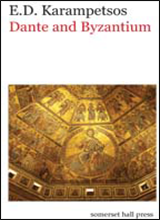E.D. Karampetsos – Dante and Byzantium. Reviewed by Penelope Karageorge
(“Karampetsos Brings a Byzantine Perspective to Dante's Divine Comedy” in National Herald, November 12-18, 2011.)
In Dante and Byzantium, E.D. Karampetsos, poet, scholar, teacher and literary and spiritual explorer, provides a fascinating journey in his search for the ties that bind the great poet Dante - Creator of the Divine Comedy - to the Byzantine world and influences. What makes this scholarly work so intriguing is Karampetsos’ curiosity and daring. He unites and makes relevant his own first experiences of Byzantine iconography as viewed in a small church in Montana - and his mother’s own experience of the icons - to the great art of Florence and Ravenna, and Dante’s masterpiece.
Boiling down his thesis - and it is a valid and fascinating one - Karampetsos says that the Divine Comedy, although viewed as spouting of Western tradition and Roman Catholicism - is actually much more reflective of the Byzantine and Orthodox approach to faith. As Dante climbs, towards the light, he is taking the mystic trip of Byzantine masters, who created their art for that express purpose.
Says Karampetsos: “the ideal post-Byzantine reader of Dante is Nikos Kazantzakis, the twentieth century Greek author. Kazantzakis’ spiritual struggles make this connection clear. Kazantzakis spent much of his adult 1ife fruitlessly trying to attain an experience of the divine similar to the one described by the Florentine poet he admired and imitated.
While far from light reading - a book that will send you to the dictionary more than once to look up words like anagogical and apokatastasis - the study offers a fascinating exegesis of Dante and brings together intriguing and disparate “Western” and Byzantine elements. And it presents a new appreciation of the rare and unique art of iconography. When I read it I felt I was in the company of a scholar who appreciated the surprise and warmth of Greek icons. Like taking a walk with him, on a Greek island and knowing the delight and homecoming of walking into a small, deserted church at midday, and encountering icons rendered so faithfully by an unknown hand.
Karampetsos writes in his conclusion: “perhaps I saw connections where others didn’t because my Greek-American background gave me a slightly different perspective. My first contact with Dante was in the 1950s when I was too young to understand the text of the Inferno. My interest in Byzantium was piqued several years later, when I was in the sixth grade, because a single sentence in our history text mentioned the existence of a medieval Greek-speaking Eastern Roman Empire and sent me to the nearest encyclopedia where a single paragraph whetted my appetite for more.”
According to Karampetsos, “world history as it was taught to school children back in the 1950s had no room for the Eastern Roman Empire. World history started in Mesopotamia and Egypt and from there went through ancient Greece, Rome, France and England and ended in the United States, a clear example of evolution at work.”
“As a child of Greek immigrants,” Karampetsos continued, “I had to deal with (or ignore) the huge gap between what I learned at school and the tidbits of Modern Greek history. I picked up from Greek Independence Day speakers: basically the Modern Greeks reappear in history in 1821 after 400 years of Turkish rule. That left a 1500 year gap between the conquest of Greece by the Romans, and the emergence of the modern Greek state . . . A little reading about Medieval Italy and Byzantium makes it clear that they were indeed ‘sibling cultures.’ It is equally obvious that this connection has rarely been given the attention it deserves.”
E.D. Karampetsos has a PhD in Comparative Literature from the City University of New York and teaches in the English Department of the College of Southern Nevada. He has been published widely - including short fiction and articles about contemporary drama and modern Greek culture.
Somerset Hall Press published Dante and Byzantium. Founded ten years ago by Dean Papademetriou, a Boston attorney, Somerset publishes literary and scholarly books on various topics including history, philosophy, and religion, with a special focus on Greek studies. One of its highly acclaimed books is Pomegranate Seeds: An Anthology of Greek-American Poetry, which addresses the Greek-American, experience from a literary perspective.

